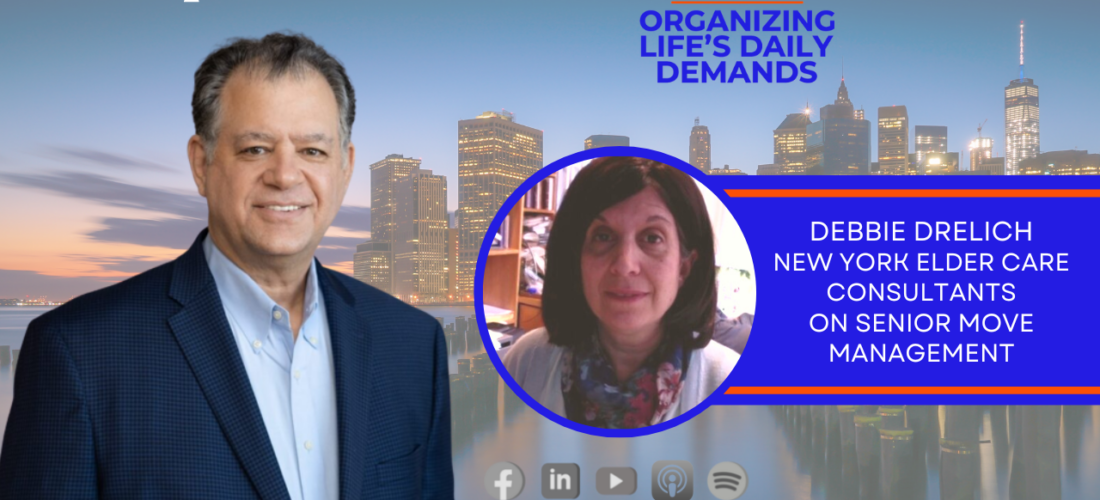
Financially Ever After: Your Guide to Late-in-Life Planning
- Posted by Jacob Gordon
- On April 13, 2023
- 0
A Guide to Late-in-Life Planning
Welcome to Organizing Life’s Daily Demands.
I’m Peter Gordon, the President of New York Financial Organizers. We help people pay their bills, deal with insurance claims, and handle all the non-investment side of finance.
Debbie Dralick is an Aging Life Care Manager with New York Elder Care Consultants. I know Debbie through a client who worked with her before I did. I was incredibly impressed with how she helped this client. New York Elder Care Consultants help with many things at different stages of people’s lives. Their average client is probably in their 90s, although some are as old as 105 and some people as young as their late 60s.
‘Care managers do the daily pills, money managers do the bills.’
Debbie has worked in this field of helping older adults for the past 38 years. When she was a kid, she had an elderly aunt and uncle who lived in a nearby nursing home and had no children of their own. Debbie’s dad used to bring her to visit them, and she seemed to be a magnet for older people. They loved talking with her, and she loved talking with them and hearing their wisdom. As time went on, she volunteered a lot in a nearby nursing home and got involved with part-time work related to helping older adults. Before she knew it, she raced through college, knowing that she wanted to work with older people. Debbie wound up working for a non-profit that was helping people who were being broken into in changing their neighborhoods and progressed from there to a community-based organization where she ran all kinds of quality-of-life programs. From there, she transitioned to working for a large geriatric institution. She has administered senior housing, adult day care, and provided consultation to families on how to take care of their aging relatives, neighbors, and friends.
So, what kind of things do aging life care managers do?
Usually, at the start of getting engaged with a client, a typical call we get is from a family member who says, “Hey, my mom lives in Manhattan, I live in Chicago and I haven’t seen Mom in a while. I was just in for Christmas, New Year’s, Passover, Easter, etc. and I was shocked to see the difference. I started looking around, and I see that Mom hasn’t really been paying her bills in a timely manner. She really hasn’t been eating well. I noticed some weight loss, and I don’t know what to do.” That’s a typical phone call. So, we generally come in and do an assessment. When we do these assessments, we’re looking for multiple things: what the person needs both physically to help them get through the day and financially. Do they need someone to help them prepare lunch and maybe safely take a shower? Or, do they need someone to help them get in and out of bed? From there, we develop a personalized plan to most effectively help them.
It’s never too late to start long-term financial planning.
I am so pleased with myself and my staff that we come up with these great plans but there’s a very important component that no matter what grade plan we come up with will not work without the individual being able to afford it. Unfortunately, the cost of Elder Care is super expensive and many people, even those who have planned for their later years in life, have not managed to save a nest egg big enough to be able to pay for care. Furthermore, their kids are typically completely clueless about how to plan and financially organize their parent’s long-term care. I’m talking about intelligent people who are unprepared for long-term financial planning, even if they have inherited stock from family members.
I had a conversation with some family members who had inherited stock from a family member like 40 years before and had no idea what the value was. This woman told me “I have something maybe like fifty thousand dollars.” Well, what they had was more than half a million dollars worth of assets and we were able to then connect with their financial advisor and we brought a trusted elder law attorney into the picture. Since the person was kind of clueless you know we got a daily money manager involved as well to coordinate everything so that this person was able to get the care they need.
I mentioned that I have a client as old as 105. and some are as young as their late 60s as you know certain illnesses like Parkinson’s for example really affect people in their 60s and 70s but it doesn’t mean that they’re going to only need services for two or three years. In many case, like my 105-year-old lady, I met her when she was 93. We do come across a lot of people who we really need to help them figure out what they need and put services in place.
Working in teams to support the client:
Every client is different because some clients have financial advisors, some clients have attorneys, and others don’t. I like to say that I’m a spoke in the wheel, and there are all these different spokes that support the wheel, which is the client. So, I am a big proponent of working with Aging Life Care managers. What we say is, ‘Care managers do the pills daily, and money managers do the bills.’ As you mentioned, because of the needs of the elderly as well as the aging population, this is happening more and more. We recently talked about a client that I have who has long-term care insurance, but it’s going to be running out of money.
I’m currently working with a fellow who planned very wisely. He purchased a policy, which cost a lot of money at the time. For him, it was probably like five thousand dollars a year that he paid for many years, probably about 25 years, and it was a three-year benefit. I guess actuaries somewhere figured out that the average lifespan of someone is about two years or something like that, maybe three years. They’re in business insurance companies to make money, and well, this fellow is now about six months away from the end of his three-year policy. In addition to that, the policy, which was a decent policy, pays $200 a day. Two hundred dollars a day covers a little less than about 60 percent of the cost of his needs. So, he was supplementing the policy with his savings, and now, as I said, he has about six months left of the policy. He had been supplementing, and paying for care now for two years, so his savings are being decimated, and we had to connect him with an elder law attorney. Thankfully, Medicaid is picking up. The only problem is that Medicaid offered this fellow, who can basically walk a maximum of about 15 to 20 steps, six hours a day of care. Now, the family is like, ‘How could that be?’ and they said, ‘We told you from the beginning we cannot control what we can’t control, and this may happen.’ So unfortunately, they are going to have to continue to supplement to pay for what he needs now, while we’re trying to re-strategize and find a different type of program within the Medicaid system, and hopefully, we’ll be able to get him what he needs, but that’s going to take about another four months. It’s always like thinking and re-strategizing and connecting with the folks who are paying their bills to see on a daily basis what’s left, what’s not left, and what families have to help with if there are families who are able to. With the situation with my client, she’s going to run out of money, and she doesn’t have any additional savings, and we’re going to have to try to find her a place to live that she can afford and get care. It’s tricky. It’s very about another four months. So, it’s always helpful to have an Aging Life Care manager, anybody who is facing these challenges, whether it’s by themselves or with their family members, whether they’re local or far away.
I was once told by a client not too long ago that I was like his emotional support friend. When I jokingly asked if he meant like a fun, sweet puppy, he said it was better than that. He explained that I helped him avoid feeling like he was losing his mind when faced with the ridiculousness of the broken medical and care systems for older adults. We’re going to get through these challenges together.
Another client once told me that he was a very brilliant man, a college professor at Columbia University. He was a really smart guy, but he said, ‘Debbie, it makes no sense what you’re telling me.’ I said to him, ‘You know what, let go of it.’ Debbie is an incredible guide, support, and pleasure to work with. She is reliable and possesses all the qualities you need from a professional in the work that she does. I know she’s a wonderful colleague, and I’m grateful to work with her. So, I urge you to reach out to her at www.nyeldercareconsultants.com

0 comments on Financially Ever After: Your Guide to Late-in-Life Planning